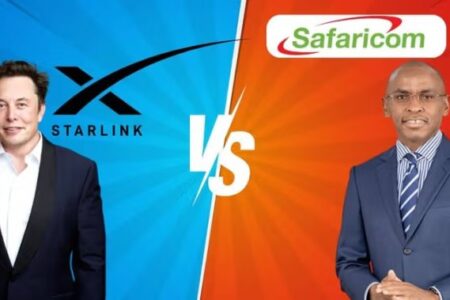Safaricom, the largest telecommunications network provider in Kenya, intends to partner with tech juggernaut Elon Musk’s Starlink, which has disrupted the internet market owing to its competitive packages and faster internet speeds.
Speaking to Bloomberg, Safaricom Chief Executive Officer Peter Ndegwa explained that the potential partnership will ensure Musk’s Starlink complements local technology.
He added that the satellite technology is effective in providing internet to rural areas and other places that fibre-based technology, used by Safaricom and other local providers, cannot access.
Ndegwa also heaped praise on Safaricom’s impact, noting that 4G technology has 95 percent reach across the country while fibre optic cable is becoming a fan favourite for homes and multinational companies.
The CEO was responding to concerns about curtailing Starlink’s wave after writing to the Communications Authority of Kenya (CA), asking them to reconsider its decision to grant licenses to satellite internet providers.
From a satellite perspective, we have to partner with Starlink or other satellite providers in the future to make sure that that technology plays right through. We have had some discussions, and we will continue to have those discussions to the extent that they complement what we are offering,” he told an American news outlet.
“Fibre is one of the best in the region. The satellite adds to or complements the rest of the technology. What we’re telling the regulator is that satellite is used in places not covered today because it will benefit the country rather than competing in urban areas. We’re not worried about competition; we will deal with it.”
While explaining further about the letter to CA, Ndegwa explained that the telecom expressed its views as part of public participation and sought to find a way for the satellite technology to fit in the Kenyan market.
I think there’s a misconception about Safaricom getting in the way. We’re not the regulator. We had expressed our views about how the regulator should ensure industry players express their views about how this is in terms of public participation, which is enshrined in the Constitution,” he noted.
“That is the point because we don’t have the ability to prevent anyone from operating in Kenya. That is a regulatory decision.”
Globally, several governments, such as Taiwan and India, have raised concerns about whether the satellite internet service complies with the local laws.
Locally, critics have argued that Starlink has swept the market that has largely been dominated by Safaricom and enticed customers with sweeter bargains.
I wouldn’t call it dominance. We’ve been successful because we have invested in Kenya for a long time. Many people don’t realise we actually got licenses all around the same time across the industry,” Ndegwa explained.
“We invest between USD 300 million and USD 350 million every year to expand infrastructure and continue to create access. So it sharpens our ability to compete. I think the most important thing is to make sure there’s a level playing field. We are a local company that has been very successful.”
“We pay a billion US dollars in taxes every year. We are the largest business listed on the stock exchange. Clearly, we have a voice, and we need to make sure that voice is heard, but we don’t want to limit consumer choice.”
President Ruto recently weighed in on the matter during a roundtable discussion in New York, stating that Starlink’s presence has created a health competition in the market, making Safaricom to provide better services.
I have my CEO for Safaricom; sometimes he’s not very happy with me for bringing other characters like Elon Musk and others into the space. I keep encouraging Peter that competition makes you keep ahead, and he’s been doing pretty well; I must admit, he’s really upped his game,” Ruto said.
Recently, Safaricom upgraded its fibre internet speeds in a bid to edge the competition. This included introducing a Platinum package that offers 1,000 Mbps to meet the needs of heavy internet users, such as gamers and content creators.
On the other hand, Starlink has introduced a Starlink mini kit that will cost $209.9 with monthly packages beginning from $10.1.
The mini kit is smaller in size and portable as compared to the Starlink Standard, which is bigger and has a price tag that ranges from $307.1 to $575.3.
